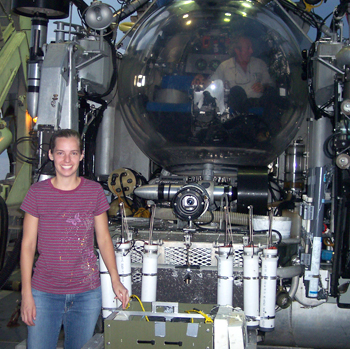
Sealink submersible (photo: Jeff Chanton, FSU Department
of Oceanography)
A L’Oreal USA Fellowship for Women in Science has been awarded to Florida State University alumna Laura Lapham, a postdoctoral research assistant and courtesy faculty member in FSU’s Department of Oceanography, and this year, one of just five young women scientists in the nation selected for the prestigious $40,000 prize.
The L’Oreal USA Fellowships for Women in Science program—administered by the American Association for the Advancement of Science (AAAS)—was launched in 2003 to help women in science achieve their goals by providing them with funding to help support 12 months of postdoctoral research. Highly competitive, the fellowships are bestowed each year on a small, elite group of researchers from the fields of mathematics, engineering, technology (including computer science), and the life and physical/material sciences.
For 2008, Lapham, 33, a native of Sarasota, Fla., was one of 196 applicants.
Those fellowships represent a much-needed investment. In the United States, women earn half of all science degrees and comprise half of the total workforce yet hold just 20 percent of the science jobs.
Lapham’s $40,000 award will underwrite new instrumentation essential to her geochemical research in the Gulf of Mexico on the formation and decomposition of deep-sea gas hydrates—ice-like crystalline formations containing methane gas within the ice lattice.
"There is a lot of interest in gas hydrate deposits as a potential energy source," said Lapham, who collects samples of the hydrates, found in oceanic sediments on the sea floor, via a manned submersible vehicle. "Deposits of hydrates are thought to be the world’s largest reservoir of methane, a powerful greenhouse gas and fossil fuel."
She noted that while hydrates are generally stable under high pressure, low temperature and saturated methane conditions such as those found in oceanic sediments and arctic permafrost, if they are destabilized, large amounts of methane could be lost from ocean sediments and reach the atmosphere.
"That’s a concern," Lapham said, "because studies have suggested that methane-filled hydrates have been agents of climate change in the geologic past."
After graduating from FSU in 1997 with a Bachelor of Science degree in chemistry, Lapham earned her Ph.D. in Marine Sciences from the University of North Carolina-Chapel Hill in 2007—where as it happens, her advisor was both an undergraduate and graduate alumnus of FSU. In April 2007 she returned to FSU as a "post-doc" in the oceanography department. There, she assists Professor Jeff Chanton, with his research while also pursuing her own, and helps train graduate students in the department’s laboratory.
It’s been a banner year for Lapham.
In addition to the $40,000 Women in Science fellowship she recently received, earlier this year the National Research Council (NRC) awarded her $50,000 in support of her research and also is providing the funding for her two-year courtesy faculty position at FSU.
What brought Lapham back to her undergraduate alma mater?
"I first worked for Jeff Chanton as an undergraduate here in the ’90s, and then, like now, I was always impressed not only with his contagious excitement about his research but also with the type of research being conducted in the FSU oceanography department," Lapham said. "So often it has some noteworthy impact on the state of Florida, and that’s what appeals most to me—conducting research for a purpose, and finding answers to questions that the average person really cares about."
The 2008 L’Oreal USA Women in Science Fellowship competition culminated in late May with three days of events in New York City that included an awards ceremony, media training, networking opportunities and professional development workshops for the winners. Sponsored by the AAAS, the workshops comprised topics such as job search techniques, budget development for grant requests and strategies for peer-reviewed publication.
Two days later Lapham was at sea, pursuing her research in the Gulf of Mexico.




